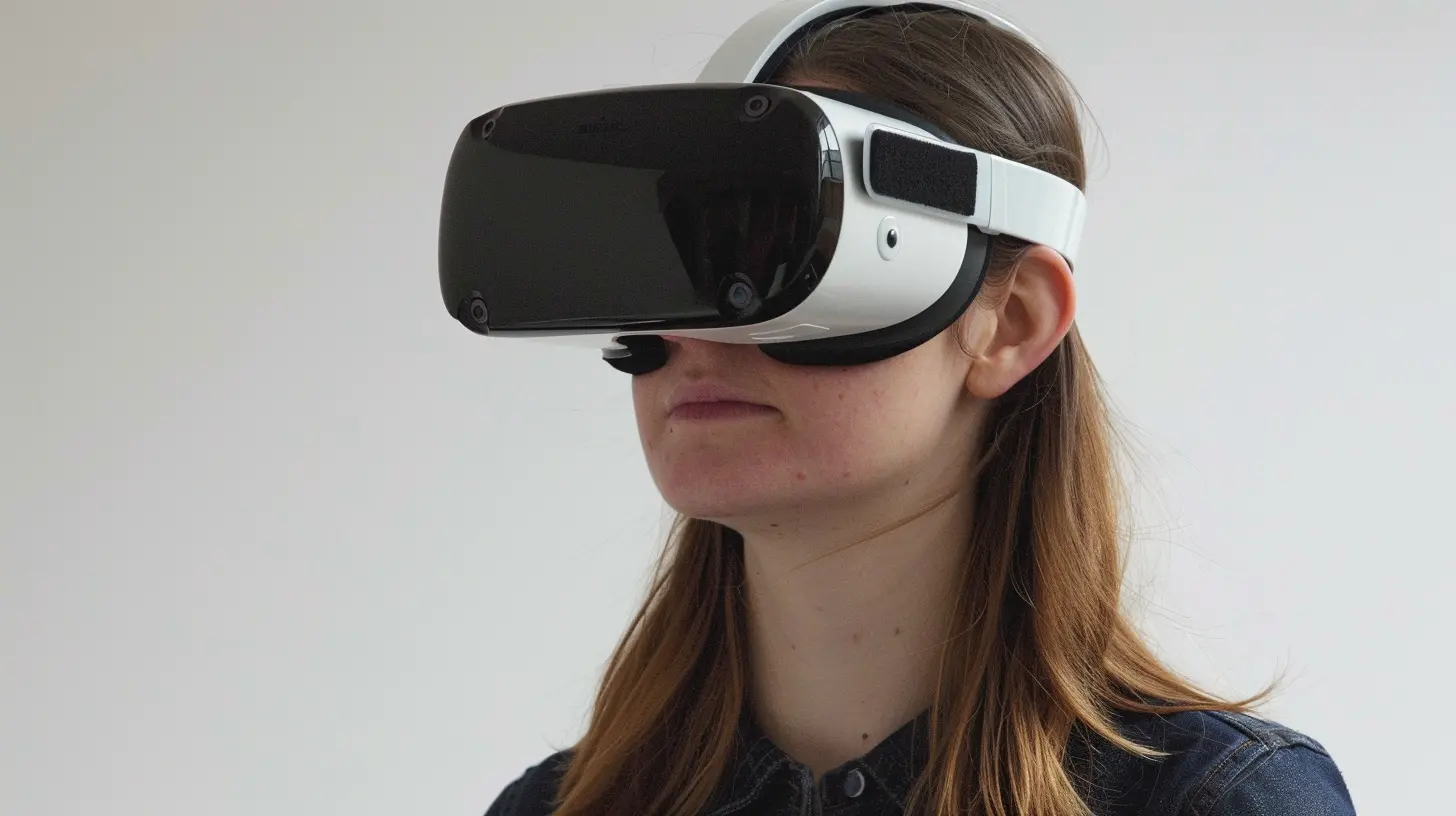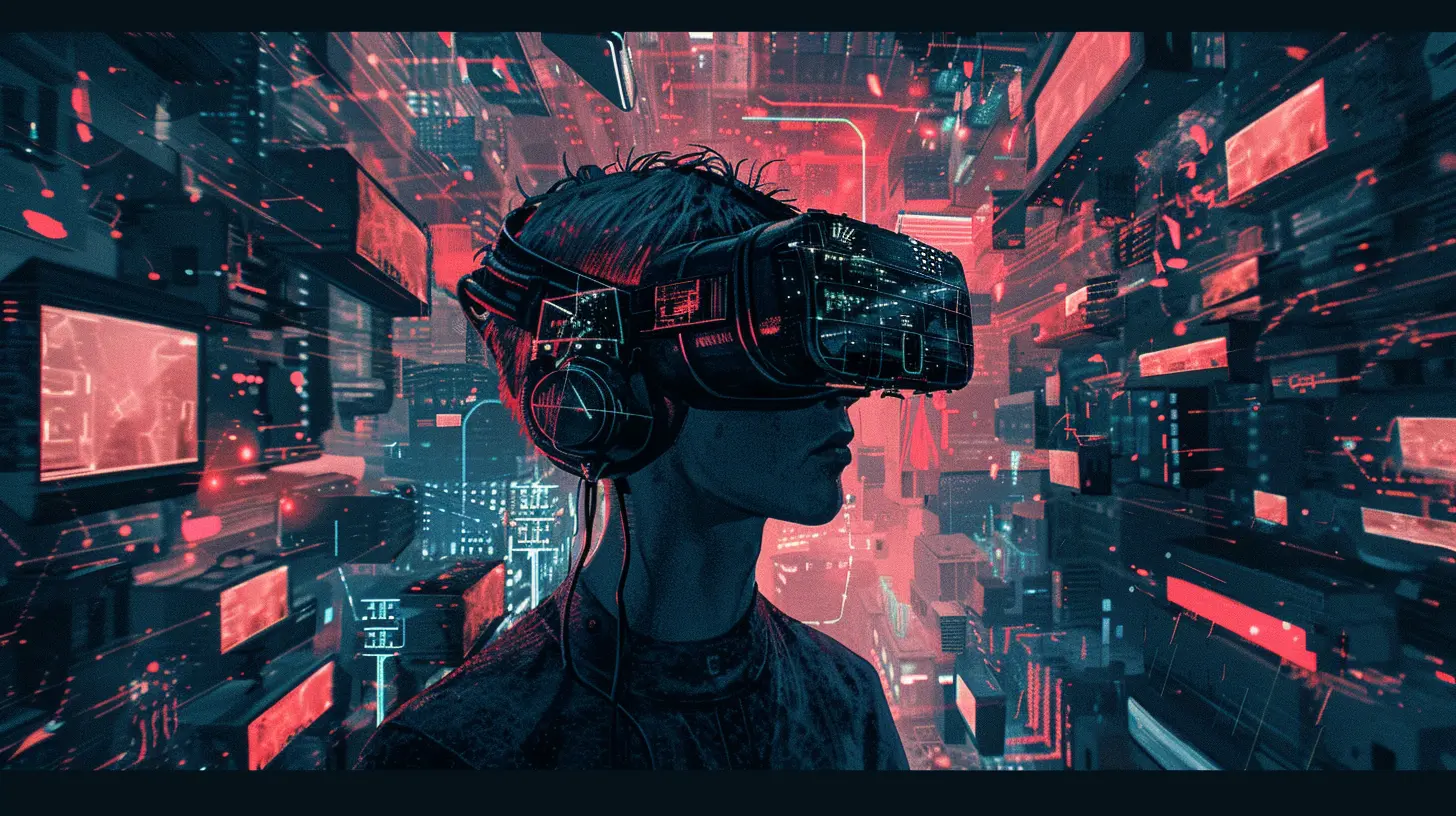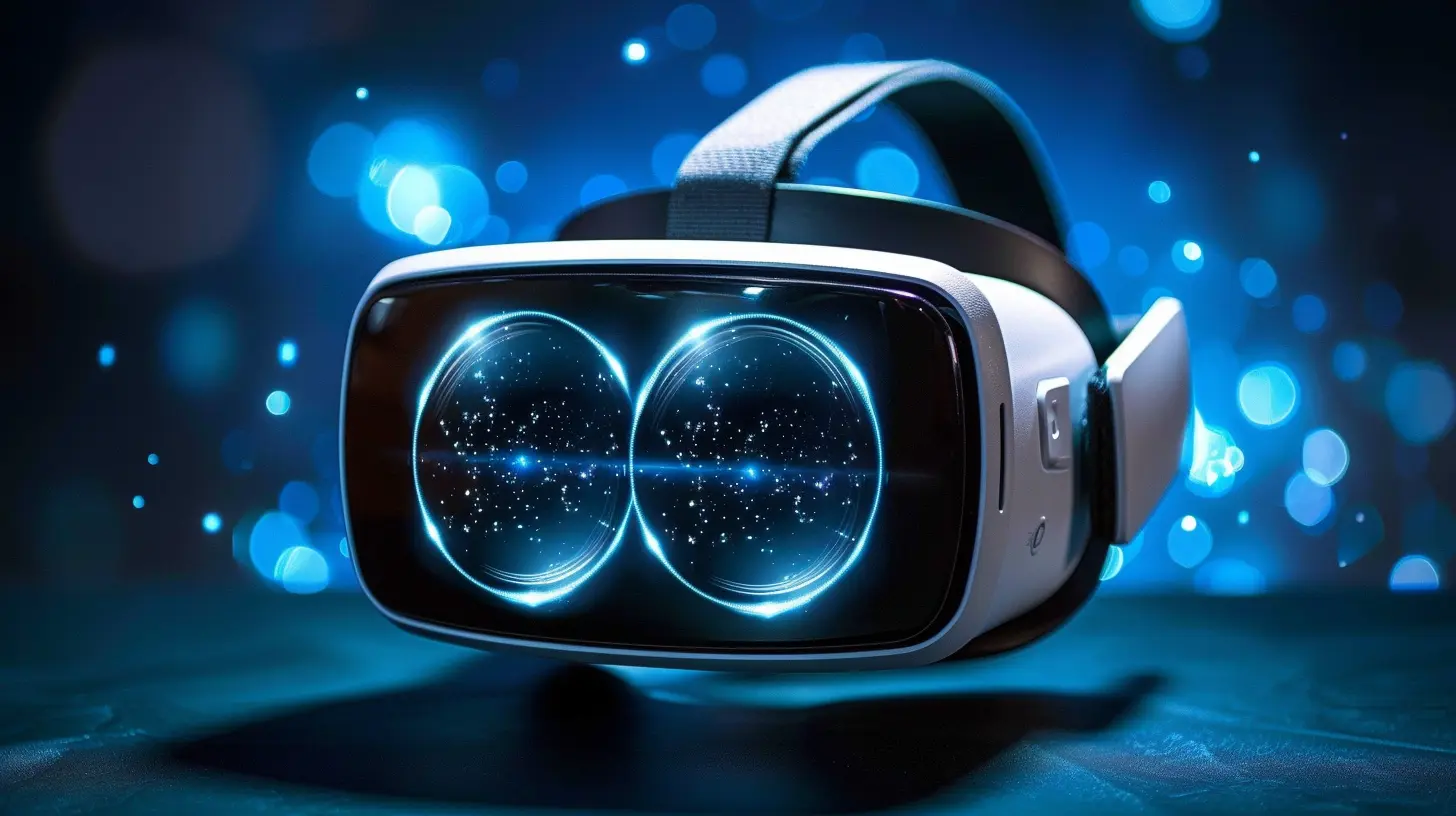Exploring the Psychological Effects of Long-Term Virtual Reality Use
25 November 2024
Virtual reality (VR) is no longer just a futuristic concept. What was once considered science fiction has slowly integrated itself into our daily lives. From gaming and entertainment to education and healthcare, VR is everywhere. But as the technology becomes more immersive and accessible, there’s a growing concern: What happens to our minds after prolonged exposure to virtual reality?
In this article, we’re going to dive deep into the psychological effects of long-term VR use. We’ll explore both the positive and negative impacts, and what you should keep in mind if you’re someone who’s regularly strapping on a VR headset.

The Rise of the Virtual World
VR is like a portal to another dimension, offering users the chance to experience alternate realities without leaving their living room. Whether you're wandering through fantasy landscapes, practicing surgery techniques, or even attending virtual business meetings, VR allows you to be somewhere else without physically being there. Sounds amazing, right?But as VR becomes more realistic, we need to ask: How does our brain interpret these virtual experiences? And more importantly, how does it affect us over time?
The Brain in Two Worlds
Our brains are incredibly adaptable, but they’re also designed to process the real world. In VR, your senses are tricked into believing that what you’re seeing, hearing, and even touching is real. The brain reacts as though the experience is happening in the physical world, even if it’s just pixels on a screen.This can be both a blessing and a curse. On one hand, VR can be used therapeutically. For example, it can help treat PTSD or anxiety by allowing individuals to face their fears in a controlled environment. On the other hand, extended use of VR could lead to a blur between reality and fiction—an unsettling thought for some.

The Positive Psychological Effects of VR
Let’s start with the good news. VR isn’t all doom and gloom. In fact, it has the potential to bring about some pretty incredible psychological benefits when used properly.1. Stress Relief and Relaxation
One of the most surprising benefits of virtual reality is its ability to reduce stress. Imagine being able to escape to a peaceful beach or a serene mountain retreat whenever you're feeling overwhelmed. VR can provide that escape, offering a mental break from the stresses of everyday life.Studies have shown that VR environments designed to promote relaxation can significantly reduce anxiety and stress. It’s like a mini-vacation for your brain—something we all could use from time to time.
2. Therapeutic Uses
As mentioned earlier, VR is being used in therapy, especially for people with PTSD, anxiety disorders, or phobias. The immersive nature of VR allows patients to confront their fears in a safe, controlled setting, which can lead to real-life improvements.For example, someone with a fear of flying can gradually become more comfortable by experiencing virtual flights. The key is that they can control the intensity and frequency of the exposure, which helps desensitize them over time.
3. Enhanced Learning and Skill Development
VR is not just for fun and games. It’s a powerful educational tool, offering immersive learning experiences that traditional methods just can’t provide. Whether it's medical students practicing surgeries or astronauts preparing for space missions, VR allows people to learn by doing.This hands-on approach can lead to better retention of information and quicker skill development. The brain treats these virtual experiences as real, meaning users are more likely to remember what they’ve learned and apply it in real-life situations.
4. Social Connection
VR also has the potential to combat loneliness. In an increasingly digital world, it’s easy to feel disconnected from others. But VR offers new opportunities for social interaction. Virtual worlds like VRChat or AltspaceVR allow users to meet people from all over the globe, hang out, and even collaborate on projects.For those who might struggle with social anxiety or physical limitations, these virtual spaces can provide a sense of community and belonging that might otherwise be out of reach.

The Negative Psychological Effects of Long-Term VR Use
As with any technology, there’s always a flip side. While VR offers some amazing benefits, there are also potential risks that come with long-term use. Let’s explore a few of the psychological downsides.1. Cognitive Overload
If you’ve ever felt mentally drained after a long VR session, you’re not alone. Virtual environments bombard your brain with sensory information—visuals, sounds, and sometimes even haptic feedback. While this can be exciting in short bursts, prolonged exposure can lead to cognitive overload.This can manifest as headaches, dizziness, or even “cybersickness” (a form of motion sickness). The brain is working overtime to make sense of the virtual world, and after a while, it gets tired. Think of it like trying to read a book while riding a roller coaster—you can only handle so much before your brain says, “Enough!”
2. Detachment from Reality
The more time you spend in VR, the harder it can be to distinguish between what’s real and what’s not. This detachment from reality can be especially concerning for individuals prone to dissociative disorders or those who already struggle with distinguishing their thoughts from reality.While VR is designed to be immersive, the danger arises when people start to prefer the virtual world over the real one. After all, why deal with the mundane day-to-day when you can be a superhero or explore an alien planet?
3. Reduced Physical Activity and Health Impacts
Let’s be honest—for most of us, VR doesn’t involve much physical movement. Sure, there are VR fitness games, but many people use it while sitting or standing in place. Over time, this sedentary behavior can lead to a decrease in physical activity, contributing to health issues like weight gain, poor posture, and even muscle atrophy.Additionally, prolonged exposure to screens in VR, much like with traditional screens, can contribute to eye strain and fatigue. While VR headsets continue to improve, they still don’t offer a perfect representation of depth and distance, putting additional strain on your eyes.
4. Addiction and Escapism
Here’s where things can get a little dark. For some people, virtual reality becomes more than just a fun escape—it becomes an obsession. VR addiction is a real phenomenon, with individuals spending countless hours in virtual worlds, at the expense of their real-world relationships and responsibilities.This can lead to a whole host of psychological issues, including depression, anxiety, and even social isolation. The virtual world becomes a crutch, a place to hide from real-life problems rather than dealing with them head-on.

The Long-Term Impacts: What Does the Future Hold?
So, what happens after years of regular VR use? We’re still in the early stages of understanding the long-term psychological effects, but researchers are keeping a close eye on it.Some experts believe that with moderation, VR can continue to offer a range of benefits without significant downsides. However, there’s also concern that as VR becomes more immersive and accessible, we may see an increase in issues like addiction, cognitive overload, and detachment from reality.
The Importance of Balance
As with anything, balance is key. VR can be an amazing tool for learning, relaxation, and entertainment, but it’s important to use it mindfully. Just like you wouldn’t spend all day watching TV or playing video games, it’s crucial to take breaks and engage in real-world activities.It’s also important to remember that while the virtual world can offer temporary relief from stress or anxiety, it’s not a substitute for real-life connections and experiences. At the end of the day, no matter how advanced VR becomes, it can never fully replace the richness of the real world.
Conclusion: Tread Carefully in the Virtual World
Virtual reality is an exciting frontier, full of possibilities. But as we continue to integrate this technology into our lives, we need to be mindful of how it affects our minds and bodies. While there are plenty of positive psychological benefits, there’s also the potential for long-term negative effects if we’re not careful.So, the next time you strap on that VR headset, enjoy the experience—but don’t forget to take it off every once in a while. After all, the real world is still pretty amazing too.
all images in this post were generated using AI tools
Category:
Virtual RealityAuthor:

Michael Robinson
Discussion
rate this article
22 comments
Kenna Brooks
“Long-term virtual reality use: where you can escape reality so thoroughly that even your houseplants start to question your commitment. Just remember, if your virtual pet starts giving you the silent treatment, it might be time to log off and water the real ones!”
February 21, 2025 at 11:20 AM

Michael Robinson
Great point! Balancing virtual experiences with real-life responsibilities is crucial for mental well-being. Thanks for highlighting the importance of staying connected to our physical environment!
Henrietta Griffin
While VR immerses us in new worlds, it’s essential to reflect on whether we’re enhancing our reality or simply escaping from it. Balance is key.
February 5, 2025 at 12:38 PM

Michael Robinson
Absolutely, finding that balance between immersion and reality is crucial for our well-being. It's important to engage with both worlds mindfully.
Lysara Sanders
Insightful article! Understanding the psychological impacts of long-term VR use is crucial as technology evolves, guiding developers and users towards healthier experiences.
January 31, 2025 at 8:22 PM

Michael Robinson
Thank you for your thoughtful feedback! I'm glad you found the article insightful. Understanding these impacts is indeed vital as we navigate the future of VR.
Amber McGlynn
Great insights on the psychological impact of VR! It would be interesting to see more research on balance and healthy usage guidelines for users.
January 27, 2025 at 4:03 AM

Michael Robinson
Thank you for your feedback! I agree that further research on balance and healthy usage guidelines is crucial for maximizing the benefits of VR while minimizing potential risks.
Ruby Summers
This article offers valuable insights into the psychological implications of prolonged VR use. It would be interesting to explore practical recommendations for users to mitigate potential negative effects, such as setting time limits or incorporating breaks. These strategies could enhance the VR experience while prioritizing mental well-being.
January 22, 2025 at 9:19 PM

Michael Robinson
Thank you for your insightful suggestion! Incorporating practical recommendations like time limits and breaks is indeed essential for promoting mental well-being while enjoying VR. I'll consider expanding on these strategies in future discussions.
Rocco McWain
This article insightfully highlights both the potential benefits and risks of prolonged virtual reality use on mental health.
January 19, 2025 at 7:23 PM

Michael Robinson
Thank you! I'm glad you found the discussion on the balance of benefits and risks in virtual reality use insightful. Your engagement is appreciated!
Joy Frye
This article provides valuable insights into the psychological impacts of long-term virtual reality use. Understanding both the benefits and potential drawbacks is essential as VR technology continues to advance. Thank you for shedding light on this important topic!
January 16, 2025 at 8:46 PM

Michael Robinson
Thank you for your thoughtful comment! I'm glad you found the insights valuable as we navigate the complexities of long-term VR use.
Reagan McEvoy
Oh, fantastic! Just what we needed—more excuses for my VR headset collecting dust while I ponder the deep psychological implications of my avatar's choices. Who knew that battling virtual dragons could leave me emotionally scarred? Great, now I feel even worse about my gaming habits!
January 11, 2025 at 3:49 AM

Michael Robinson
I understand your concerns! It's fascinating how deeply immersive experiences can impact our emotions and self-reflection, but it's also important to find balance and enjoy gaming without guilt.
Gavin Mahoney
Long-term virtual reality use can blur the lines between reality and immersion, potentially impacting users' social skills and mental well-being over time.
January 3, 2025 at 1:51 PM

Michael Robinson
You raise an important point. Sustained virtual reality use can indeed challenge the balance between real-world interactions and immersive experiences, highlighting the need for mindful usage to safeguard mental well-being and social skills.
Jinx Baxter
Fascinating insights! Understanding VR's psychological impact is crucial for responsible development.
December 29, 2024 at 5:39 AM

Michael Robinson
Thank you! I'm glad you found the insights valuable—understanding these effects is indeed essential for shaping responsible VR experiences.
Kenneth McManus
This article beautifully highlights the profound impact of long-term virtual reality use on our mental well-being. It's essential to consider both the immersive experiences and potential psychological challenges that come with them. Thank you for shedding light on this important topic—it's a conversation we need to keep having as technology evolves.
December 23, 2024 at 8:44 PM

Michael Robinson
Thank you for your thoughtful insights! I completely agree that it's crucial to balance the benefits of immersive experiences with the potential psychological challenges. Continuing this conversation is essential as technology advances.
Eva Ward
This article sheds light on the often-overlooked psychological impacts of long-term virtual reality use. It prompts important discussions about balancing immersive experiences with mental well-being—an essential consideration for future tech developments.
December 12, 2024 at 1:31 PM

Michael Robinson
Thank you for your insightful comment! I completely agree that addressing the psychological impacts of long-term VR use is crucial for ensuring a healthy balance in tech development.
Coral McCloud
Long-term VR use can reshape perception and social interactions, highlighting the need for ongoing research into its psychological impacts. Balancing immersive experiences with mental health considerations will be crucial as technology evolves.
December 4, 2024 at 12:27 PM

Michael Robinson
Thank you for your insightful comment! You're absolutely right—understanding the psychological impacts of long-term VR use is vital, and ongoing research will help us navigate the balance between immersive experiences and mental health.
Finn McKinley
This article provides valuable insights into the psychological impacts of prolonged virtual reality use, highlighting both potential benefits and risks. A balanced understanding is crucial for optimizing VR experiences and ensuring user well-being.
December 1, 2024 at 8:20 PM

Michael Robinson
Thank you for your insightful comment! I'm glad you found the article valuable in addressing both the benefits and risks of prolonged VR use. Your perspective on the importance of balance is crucial for enhancing user experiences.
Brooks McSweeney
Great insights into the psychological impacts of extended virtual reality use! It would be fascinating to delve deeper into potential mitigation strategies for any negative effects, perhaps exploring the role of moderation and breaks. Understanding these aspects could be crucial for users and developers alike. Keep up the good work!
November 29, 2024 at 7:39 PM

Michael Robinson
Thank you for your thoughtful comment! I agree that exploring mitigation strategies like moderation and breaks is essential for both users and developers. Your insights highlight an important area for future research!
Rusty McGeehan
This article sheds light on the intriguing psychological impacts of prolonged virtual reality use. Understanding these effects is crucial as VR technology continues to evolve and integrate into our daily lives.
November 28, 2024 at 7:46 PM

Michael Robinson
Thank you for your insight! Understanding the psychological impacts of long-term VR use is indeed essential as the technology becomes more integrated into our lives.
Lorelei Turner
This article dives deep into the often-overlooked psychological impacts of prolonged virtual reality use. It's crucial for both users and developers to understand these effects for healthier VR experiences.
November 28, 2024 at 11:34 AM

Michael Robinson
Thank you for your insightful comment! Understanding the psychological impacts of prolonged VR use is indeed essential for fostering healthier experiences for users and developers alike.
Beatrice McDowney
Long-term virtual reality use blurs the line between reality and illusion, challenging our perceptions of self, connection, and existence itself.
November 28, 2024 at 4:51 AM

Michael Robinson
Thank you for your insightful comment! Indeed, the interplay between virtual reality and our perception of reality poses significant psychological questions that merit further exploration.
Annette Lambert
Reality bends, minds expand.
November 27, 2024 at 8:23 PM

Michael Robinson
Absolutely! Virtual reality challenges our perceptions and can lead to profound psychological shifts over time.
Alexa McWhorter
Exciting insights on the psychological impacts of long-term VR use! As we embrace this technology, let's prioritize mental well-being and create experiences that uplift and inspire. The future is bright in the virtual world!
November 27, 2024 at 11:23 AM

Michael Robinson
Thank you for your thoughtful comment! Prioritizing mental well-being in VR is essential as we navigate this exciting frontier. Let's continue to create positive experiences together!
Ember Rivera
Virtual reality is more than a technology; it's a gateway to our minds. As we delve into its long-term effects, let’s embrace its potential to reshape our perceptions and well-being, encouraging a balanced and mindful approach to immersive experiences!
November 27, 2024 at 4:14 AM

Michael Robinson
Thank you for your insightful comment! I completely agree that virtual reality offers profound opportunities for reshaping perceptions, and it's crucial to approach its use with mindfulness and balance as we explore its psychological effects.
Flynn Mathews
This article raises important points about the psychological impacts of prolonged VR use. As someone who enjoys virtual experiences, I appreciate the insights shared here and the need for a balanced approach to technology. Thank you for the thought-provoking read!
November 25, 2024 at 1:10 PM

Michael Robinson
Thank you for your thoughtful comment! I'm glad you found the article insightful and important for understanding the balance in our virtual experiences.
MORE POSTS

Off-Grid Solar Systems: A Step Toward Energy Independence

How Tech Startups Are Disrupting Traditional Industries

Efficient Memory Management Techniques for Android Apps

How Blockchain is Driving the Future of Peer-to-Peer Networks

Key Challenges Tech Startups Face and How to Overcome Them

The Role of AI in Modern Digital Camera Technology

How Templates and Presets Can Revolutionize Your Content Workflow

Blockchain and the Future of Digital Identity Verification

Exploring the Ethical Dilemmas of Virtual Reality in the Justice System

Understanding Zoom: Optical vs. Digital Zoom Explained

The Role of Wearable Tech in Enhancing Esports Performance

Virtual Private Networks (VPNs): How They Keep Your Data Secure

Exploring the Latest Trends in Personal Robotics